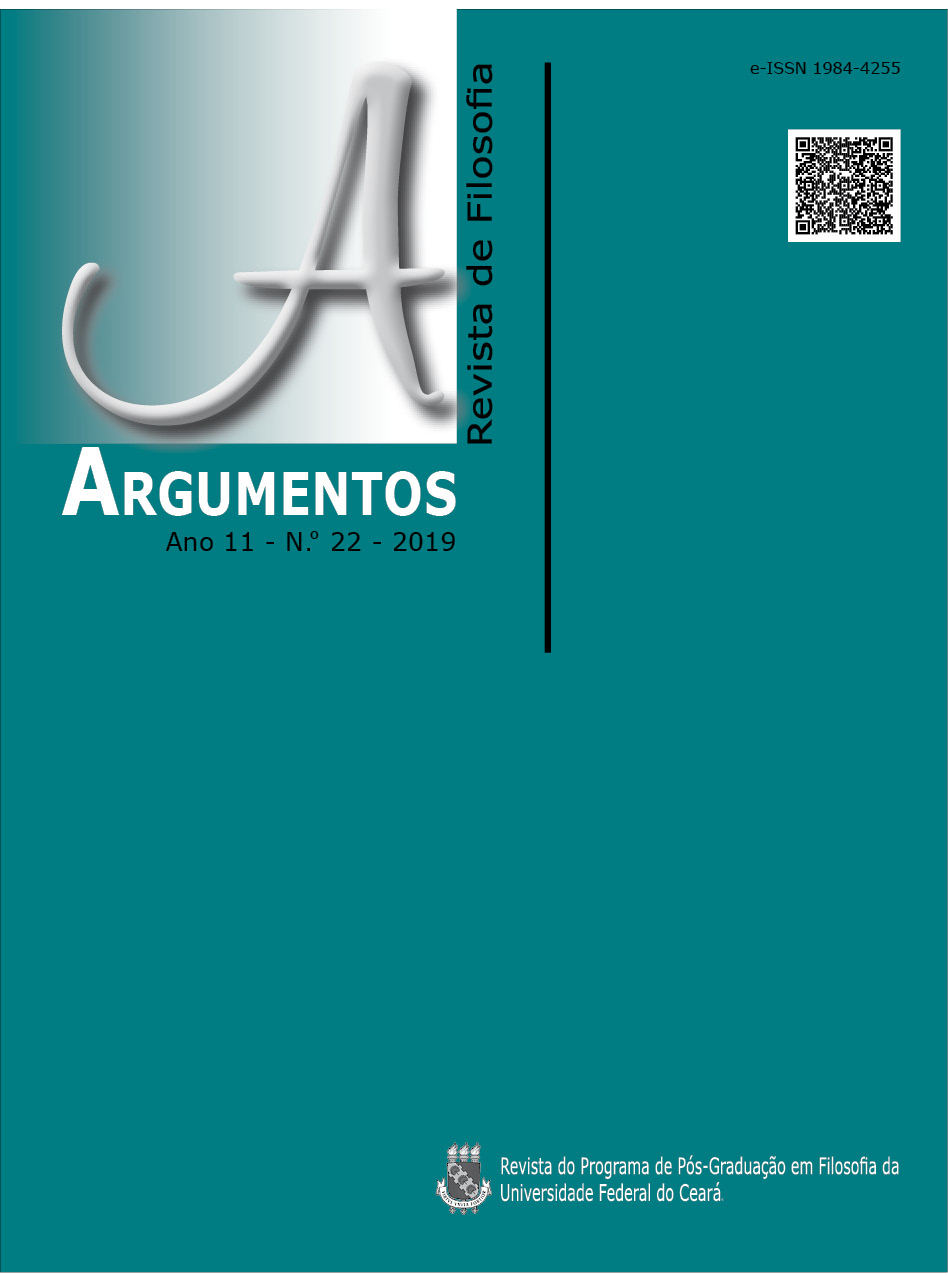Action fragility of and tragic realism in Arendt: a dialogue with Nietzsche
DOI:
https://doi.org/10.36517/Argumentos.22.14Keywords:
Arendt. Nietzsche. Fragility. Tragic.Abstract
There is a tragic realism in the background of all Arendtian thinking, which corresponds to her way of dealing with the fragility of the practical issues that lie between men, without renouncing – quite the contrary - to action. Through her Nietzschean affinity, I seek to evidence what I believe to be the intellectual posture that is the basis of all the political-philosophical reflection of Hannah Arendt, which is not only an understatement but appears explicit in many moments of her work.References
AMITRANO, Georgia. Albert Camus: um pensador em tempos sombrios. Uberlândia: EDUFU, 2014.
ARENDT, Hannah. O que é política?. Rio de Janeiro: Bertrand Brasil, 2004.
_____. Entre o passado e o futuro. São Paulo: Perspectiva, 2007.
_____. Compreender: formação, exílio e totalitarismo (ensaios 1930–1954). São Paulo: Companhia das Letras, 2008a.
_____. Crises da República. São Paulo: Perspectiva, 2008b.
_____. Homens em tempos sombrios. São Paulo: Companhia das Letras, 2008c.
_____. A vida do espírito. Rio de Janeiro: Civilização Brasileira, 2009a.
_____. A promessa da política. Rio de Janeiro: Difel, 2009b.
_____. Eichmann em Jerusalém. São Paulo: Companhia das Letras, 2009c.
_____. Origens do totalitarismo. São Paulo: Companhia das Letras, 2011.
_____. The Last Interview and other Conversations. New York: Melville House, 2013.
_____. A condição humana. Rio de Janeiro: Forense Universitária, 2014a.
_____. Más allá de la filosofía: escritos sobre cultura, arte y literatura. Ed. Fina Birulés y Àngela Lorena Fuster. Madrid: Trotta, 2014b.
BENHABIB, Seyla. The Reluctant Modernism of Hannah Arendt. Lanham, Md: Rowman & Littlefield, 2003.
BIRULÉS, Fina. Una herencia sin testamento: Hannah Arendt. Barcelona: Herder, 2007.
CAMUS, Albert. O mito de Sísifo. Rio de Janeiro: Record, 2008.
CIORAN, E. M. Cahiers, 1957-1972. Paris: Gallimard, 1997.
FORTI, Simona. Vida del espíritu y tiempo de la polis: Hannah Arendt entre filosofía y política. Madrid: Cátedra, 2001.
HEATHER, G.; STOLZ, M. Hannah Arendt and the Problem of Critical Theory. The Journal of Politics, n. 41, p. 2-22, 1979.
HEUER, Wolfgang. Amizade política pelo cuidado com o mundo: sobre política e responsabilidade na obra de Hannah Arendt. História: Questões & Debates. Curitiba: Ed. da UFPR, n. 46, p. 91-109, 2007.
ISAAC, Jeffrey C. Situating Hannah Arendt on Action and Politics. Political Theory, v. 21, n. 3, p. 534-540, Aug. 1993.
JAHANBEGLOO, Ramin. Isaiah Berlin en diálogo con Ramin Jahanbegloo. Madrid: Anaya & Mario Muchnik, 1993.
LARA, María Pía. Narrar el mal: una teoría posmetafísica del juicio reflexionante. Barcelona: Geidsa, 2009.
NIETZSCHE, Friedrich. O nascimento da tragédia. São Paulo: Companhia das Letras, 1999.
_____. A gaia ciência. São Paulo: Companhia das Letras, 2001.
_____. Segunda consideração intempestiva: da utilidade e desvantagem da história para a vida. Rio de Janeiro: Relume Dumará, 2003.
_____. A vontade de poder. Rio de Janeiro: Contraponto, 2008a.
_____. Além do bem e do mal. São Paulo: Companhia das Letras, 2008b.
PASSERIN D’ENTRÈVES, Maurizio. The Political Philosophy of Hannah Arendt. New York: Routledge, 1994.
RICOEUR, Paul. Fragilité et responsabilité. Autres Temps. Cahiers d’éthique sociale et politique, n. 76-77, p. 127-141, 2003.
ROSSET, Clément. Lógica de lo peor. Barcelona: Barral, 1976.
SAVATER, Fernando. La tarea del héroe. Madrid: Taurus, 1981.
Downloads
Published
Issue
Section
License
Argumentos magazine is licensed under an International Creative Commons Attribution License.
The Magazine uses CC BY inclusion
1) The authors retain the copyright granted to the magazine or the right to initial publication, with the work regularly licensed under the Creative Commons Attribution, which allows the sharing of the work with acknowledgment of authorship and initial publication in this magazine.
2) The authors are authorized to contract additional applicable contracts, for non-exclusive distribution of the version of the work published in this journal (for example, publication in the institutional repository or as a chapter of the book), recognition of authorship and initial publication in this journal.
3) Authors are authorized and encourage to publish and distribute their work online (for example, in institutional repositories or on their personal pages) at any time before or during the editorial process, as they can generate productive changes, as well as increase the impact and reference of published work.




.jpg)










._._3.png)
1.jpg)
._._._.png)
